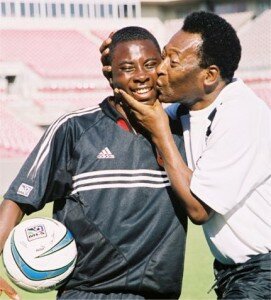 American soccer’s million-dollar baby saw his World Cup dream extinguished on Tuesday, a full month before the sport’s greatest showpiece has even begun.
American soccer’s million-dollar baby saw his World Cup dream extinguished on Tuesday, a full month before the sport’s greatest showpiece has even begun.
Based on how Freddy Adu’s career has faltered in recent years, it was no shock that he was left off the United States’ preliminary World Cup roster, ensuring him a summer spent in front of a television screen instead of packed stadiums in South Africa.
Yet given the outlandish projections made for Adu in 2003 – when, as a 13-year-old, he was handed a million-dollar endorsement deal with Nike and touted as the future of the national team – the decline has been both sad and dramatic.
By now, according to the experts, Adu was supposed to be one of the best players in the world – the first American to become a global star. Instead, he is floundering in the lowly regarded Greek league, and Tuesday’s announcement means U.S. head coach Bob Bradley does not even rate him among this country’s 30 best players.
Adu’s backstory used to resemble the first few chapters of a fairy tale but is now little more than a cautionary tale against overhyping young phenomena. He emigrated to the States from Ghana as an 8-year-old after his mother won the Green Card lottery, and was quickly spotted in the junior ranks in Maryland.
Observers could barely believe their eyes when witnessing such skills in one so young, and the soccer world soon caught on. Giant Italian club Inter Milan offered him a contract as a 10-year-old. US Soccer chiefs positively salivated at the prospect of a future superstar.
In 2004, Adu made U.S. sports history by becoming the top overall pick in the Major League Soccer draft and making his debut for D.C. United at age 14. In hindsight, such acceleration into the senior ranks smacks of madness. Back then, it was seen as merely the first stepping stone on the path to greatness.
Growing up in the spotlight didn’t do Adu much good, with the big contract, big expectations and constant scrutiny weighing heavily on his shoulders.
Since 2006, he has resembled a soccer nomad, bouncing from D.C. to Real Salt Lake and then Benfica, the Portuguese club that retains his rights but has now farmed him out on loan to three separate clubs in three years. Some positive performances for the national team in age-restricted events were interspersed, in the Under 20 World Cup in 2007 and the Beijing Olympics (where most players must be 23 or younger) the following year.
The regular spot on the senior team never came, a decision effectively taken out of the hands of Bradley by Adu’s failure to lock down regular playing time for his European clubs.
Back when the draw for the World Cup was made in December, Adu still retained some hope of being selected for Bradley’s squad.
“I’m gonna say something right now,” he wrote on his Twitter account. “I have never wanted to be a part of something as bad as I wanna be in this World Cup. Work and prayer.”
This year’s World Cup was earmarked as Adu’s time to stamp his mark on the world game. From that time years earlier, when Nike hurled cash in his direction and his future looked golden, there was always an eye on 2010.
The 2006 World Cup was seen as too soon. This one, on the African continent of his birth, was perfect.
In the end, it just wasn’t to be. The culmination of that plan did not take place in Bafokeng Stadium in Rustenburg, where the United States will meet England on June 12. It was instead in Adu’s club apartment in Thessaloniki, with the announcement of a roster that didn’t feature his name. Back to the drawing board.
So where did it all go wrong for Adu? Were the hype and expectations too much to handle? Or was he just never destined for stardom?
“It is difficult when young players do not have enough time to develop, when too much is asked too soon,” said Hector Cuper, a well-respected Argentinean coach now in charge of Adu’s Greek team, Aris. “Extra time allows for a more well-rounded game. He has ability, we can all see that.”
Yet if Adu is ever to ascend to the heights he still dreams of, it will be a grind through the ranks and a constant battle to overturn perception of him as a bust. European soccer is a cutthroat world, and there won’t be anything easy about it.
“I want to be one of the best players to play this sport one day,” Adu said in a recent interview with Sports Illustrated. “I still have the chance to do that, and I want to work hard to get there.”
“Getting there” is no longer a given. Recent signs have been reasonable, with some solid performances for Aris taking him to the brink of the 30-man U.S. squad after he was barely in contention months earlier. However, there is still a long and uncertain way to go.
“Freddy is still young and he will tell you there are things along the way he did right and things he did wrong,” Bradley said. “Now he has to take all those things to the situation he is in and show he is continuing to grow.”
Adu’s Twitter account was silent early Tuesday, perhaps a reflection of the bitter disappointment he must have seen coming.
Freddy Adu is 20 years old and he feels like yesterday’s man. Maybe his time will still come, but it won’t be this summer.
____
Yahoo Sports




